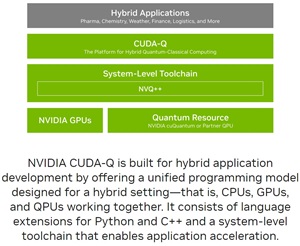News
Amid AI Buzz, NVIDIA Unveils 'Quantum Cloud' Dev/Research Service
Of course it was all about generative AI at NVIDIA's GTC event this week, but amid the AI buzz came news about a cloud service for another (possible) game-changing technology, quantum computing.
NVIDIA Quantum Cloud, now open for early access requests, provides a microservice-backed simulation platform to help developers and researchers advance the arcane field, which hasn't progressed very far in its vision of completely remaking "computing" as we know it.
It's based on the NVIDIA's open source CUDA-Q quantum computing platform, widely used to deploy quantum processing units (QPUs). The Quantum Cloud platform actually serves as a hybrid cloud of GPUs and QPUs customized for quantum-specific needs.
 [Click on image for larger view.] CUDA-Q (source: NVIDIA).
[Click on image for larger view.] CUDA-Q (source: NVIDIA).
It offers:
- Quantum simulation: Development of better algorithms and design of better processors.
- Quantum-accelerated supercomputing: Integration of quantum computing into scientific computing software systems and ecosystems and accessibility of quantum computers to domain scientists.
- AI for quantum computing: Acceleration of the computing processes required for useful quantum computing, including quantum error-correction decoding, error mitigation, calibration, and control.
- Cloud access: Access to simulated and physical quantum processors on NVIDIA DGX Cloud H100 systems.
- Integrated developer Eexperience: The experience is built into the cloud and comes with everything developers need to help them build and collaborate on quantum applications.
- Quantum application hub: An education hub is available for the quantum developers of tomorrow, offering cutting-edge applications that seamlessly run in the cloud.
"As a microservice, it lets users for the first time build and test in the cloud new quantum algorithms and applications -- including powerful simulators and tools for hybrid quantum-classical programming," the company said in a March 18 news release.
The cloud tool hooks in to third-party software integrations to advance research with capabilities including:
- The Generative Quantum Eigensolver, developed in a collaboration with the University of Toronto, leverages large language models (LLMs) to enable a quantum computer to find the ground-state energy of a molecule more quickly.
- Classiq's integration with CUDA-Q allows quantum researchers to generate large, sophisticated quantum programs, as well as to deeply analyze and execute quantum circuits.
- QC Ware Promethium tackles complex quantum chemistry problems such as molecular simulation.
"Quantum computing presents the next revolutionary frontier of computing and it's going to require the world's most brilliant minds to bring this future one step closer," said Tim Costa, NVIDIA's director of HPC and quantum computing. "NVIDIA Quantum Cloud breaks down the barriers to explore this transformative technology and lets every scientist in the world harness the power of quantum computing and bring their ideas closer to reality."
Users can apply for early access.
About the Author
David Ramel is an editor and writer at Converge 360.